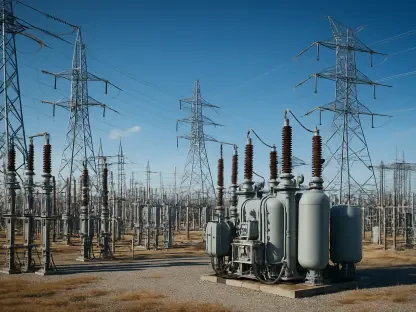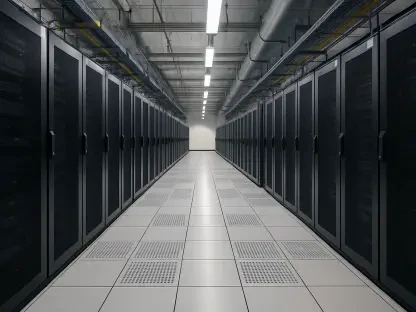In a world increasingly defined by the urgent need to combat climate change, Germany stands at the forefront of renewable energy adoption, and RWE, a leading utility company, is playing a pivotal role in this transformation with an impressive addition of over 1.7 gigawatts (GW) of capacity through solar and wind projects. RWE is not merely responding to the nation’s Energiewende—its energy transition policy—but is actively driving it forward. This shift from a fossil fuel-heavy past to a sustainable future aligns perfectly with Germany’s ambitious target of reaching net-zero emissions by mid-century, positioning RWE as a cornerstone of Europe’s green revolution. The company’s innovative approaches, coupled with strong financial performance, highlight its potential to shape the renewable landscape.
Beyond individual projects, RWE’s efforts reflect a broader narrative of resilience and adaptation in the face of global energy challenges. By turning industrial relics into renewable hubs and harnessing government support, the company is setting a powerful example for others in the sector. This journey offers not only environmental benefits but also significant opportunities for investors looking to tap into the growing green economy. Germany’s renewable market, projected to expand steadily through 2030, provides a fertile ground for such initiatives, and RWE is poised to lead the charge.
RWE’s Solar Energy Breakthroughs
Harnessing Former Industrial Lands for Solar Power
RWE has embarked on a transformative mission by repurposing decommissioned coal mining sites into vibrant solar energy hubs, particularly in the Rhenish region of Germany. Projects along the A44n motorway, with a capacity of 86.5 MWp, exemplify how the company strategically utilizes areas with simplified permitting processes and minimal local opposition. This approach not only revitalizes landscapes scarred by past industrial activity but also accelerates the deployment of clean energy infrastructure. By focusing on such locations, RWE minimizes environmental disruption while maximizing output, contributing significantly to Germany’s renewable energy goals. The ingenuity of this strategy lies in turning liabilities into assets, showcasing a model that could inspire similar efforts across Europe.
Furthermore, the financial backbone of these solar initiatives is strengthened by government incentives under the EEG (Renewable Energy Act) tenders, which provide long-term feed-in tariffs. This mechanism ensures revenue predictability, a critical factor in mitigating the inherent volatility of renewable energy production. RWE’s ability to secure these contracts reflects a deep understanding of policy frameworks, allowing for cost-efficient project execution. Such stability is vital for scaling operations in regions like North Rhine-Westphalia, where solar farms are already powering thousands of homes. This synergy between innovative land use and policy support positions RWE as a leader in the solar energy space.
Pioneering Solar Scalability and Community Impact
Another dimension of RWE’s solar strategy is its focus on scalability and integration with local communities. By leveraging existing grid infrastructure near former industrial sites, the company reduces the costs and delays associated with new connections, streamlining project timelines. This efficiency is crucial in meeting Germany’s aggressive renewable targets while maintaining economic viability. Additionally, RWE engages with local stakeholders to ensure that projects align with regional needs, fostering acceptance and reducing potential conflicts. This balance of technical innovation and social responsibility enhances the sustainability of solar expansion.
Equally important is the broader environmental impact of these solar endeavors. Transforming coal sites into renewable energy centers not only cuts carbon emissions but also symbolizes Germany’s commitment to a cleaner future. RWE’s projects serve as tangible proof of how industrial legacies can be reimagined for ecological benefit, inspiring confidence among policymakers and investors alike. As solar technology continues to advance, RWE’s proactive adoption of cutting-edge solutions ensures that its contributions remain at the forefront of the energy transition, setting a high standard for the industry.
RWE’s Wind Energy Ambitions
Scaling Up with Onshore and Offshore Projects
RWE’s wind energy initiatives are a cornerstone of its renewable portfolio, blending large-scale offshore ventures with community-focused onshore projects to support Germany’s sustainability targets. The Nordseecluster offshore wind project, a 1.6 GW joint venture, stands as a flagship effort, poised to supply power to 1.6 million households by 2029. This ambitious undertaking employs state-of-the-art turbine technology, demonstrating RWE’s commitment to maximizing efficiency and output. Such projects are pivotal in helping Germany achieve its goal of 30 GW of offshore wind capacity by the end of the decade, reinforcing the company’s role as a key player in the sector.
On the onshore front, RWE’s smaller-scale wind farms, such as the 22.8 MW installation in Mecklenburg-Western Pomerania, highlight a different yet equally vital approach. Here, the emphasis lies on forging strong partnerships with local communities to navigate social and regulatory challenges. By involving residents in the planning and benefits of these projects, RWE reduces opposition and ensures smoother implementation. This dual strategy of pursuing massive offshore developments while maintaining a grounded presence onshore illustrates a comprehensive vision for wind energy growth, balancing scale with social acceptance.
Technology and Partnerships Driving Wind Success
The technological edge in RWE’s wind projects cannot be overstated, as the adoption of advanced turbines significantly boosts energy generation capacity. Innovations like Vestas’ 15 MW turbines in offshore installations enable higher efficiency, ensuring that each project delivers maximum impact. This focus on cutting-edge solutions helps address the intermittency issues often associated with wind power, providing a more reliable energy source. RWE’s investment in such technology not only enhances its operational performance but also sets a benchmark for the industry, pushing the boundaries of what renewable energy can achieve.
Complementing this technological prowess is RWE’s strategic emphasis on collaboration, both with industry partners and local stakeholders. Joint ventures in offshore projects distribute risks and pool expertise, while revenue-sharing models in onshore initiatives, such as the Bedburg 3 framework, build trust with communities. These partnerships are instrumental in overcoming barriers to expansion, ensuring that projects are both feasible and beneficial for all involved. By prioritizing collaboration alongside innovation, RWE strengthens its position in the wind energy market, aligning with national goals and community expectations.
Financial Strength and Investment Appeal
Robust Earnings and Growth Prospects
RWE’s financial performance underscores its stability and attractiveness as an investment in the renewable energy sector, with an adjusted EBITDA of €2.1 billion and net income of €0.8 billion reported in the first half of the current year. With 11.2 GW of assets under construction, the company demonstrates a robust pipeline poised for future growth. A long-term target of €4 adjusted earnings per share by 2030, alongside a dividend increase to €1.20 per share this year, signals strong confidence in its low-cost renewable operations. This financial discipline, paired with a forward price-to-earnings ratio of 12.3x, suggests that RWE may be undervalued, presenting a compelling opportunity for investors eyeing the green transition.
Moreover, the company’s ability to generate consistent cash flows from renewable projects adds a layer of resilience against market fluctuations. The predictable revenue streams from government-backed contracts mitigate risks tied to energy price volatility, providing a stable foundation for expansion. This financial strength enables RWE to reinvest in new projects, further solidifying its market position. For investors seeking a balance of growth and security, RWE’s track record and forward-looking strategy make it a standout choice in a sector brimming with potential.
Strategic Positioning for Long-Term Value
Beyond immediate earnings, RWE’s strategic positioning enhances its long-term value proposition within the renewable energy landscape. The company’s focus on scalable operations and diversified energy sources—spanning solar and wind—reduces dependency on any single market segment, ensuring adaptability. This diversification, coupled with a strong project pipeline, positions RWE to capitalize on emerging opportunities as renewable technologies evolve. Such foresight is critical in a sector where innovation drives competitiveness, and RWE’s proactive stance offers reassurance to stakeholders.
Additionally, the broader market dynamics favor RWE’s growth trajectory, as increasing demand for clean energy aligns with its operational strengths. The company’s commitment to shareholder returns through consistent dividend growth further enhances its appeal, reflecting a balance between reinvestment and rewarding investors. As global focus intensifies on sustainability, RWE’s undervalued stock price could represent a timely entry point for those looking to invest in a leader of the green economy. This combination of strategic clarity and financial prudence sets RWE apart as a reliable contender.
Alignment with Germany’s Decarbonization Goals
Capitalizing on Policy Support and Market Growth
RWE’s renewable energy strategy dovetails seamlessly with Germany’s decarbonization ambitions, benefiting from a favorable policy environment that fuels market growth at a projected 7.27% compound annual growth rate through 2030. Securing EEG tenders under the Renewable Energy Act provides long-term revenue stability, crucial for offsetting the intermittent nature of solar and wind power. This government support, combined with access to existing grid infrastructure, allows RWE to execute projects with greater efficiency and lower costs. Such alignment with national priorities ensures that the company remains a frontrunner in a competitive landscape, contributing meaningfully to Germany’s net-zero vision.
Equally significant is the societal momentum behind renewable energy, which amplifies RWE’s impact. Public and political demand for sustainable solutions creates a tailwind for the company’s initiatives, encouraging faster adoption of clean technologies. By positioning itself at the intersection of policy incentives and market needs, RWE not only drives environmental progress but also secures a competitive edge. This strategic harmony with broader decarbonization goals underscores the company’s role as a catalyst for change, paving the way for sustained growth in the renewable sector.
Shaping the Future of Energy Transition
Looking back, RWE’s journey through Germany’s energy transition reveals a remarkable shift, as the company successfully navigated from a fossil fuel legacy to a renewable energy powerhouse with over 1.7 GW of new capacity. Its innovative repurposing of industrial lands for solar farms and the execution of large-scale wind projects like Nordseecluster demonstrate a commitment to both scale and sustainability. Financial resilience, bolstered by government-backed revenue streams, ensures that each step forward is grounded in stability, setting a precedent for the industry.
Reflecting on these achievements, the path ahead for RWE involves continued leveraging of policy support and technological advancements to expand its renewable footprint. Strengthening community partnerships remains essential to minimize resistance and maximize project success. For investors, closely monitoring RWE’s progress in meeting its ambitious targets by 2030 offers insights into potential returns in the green economy. Ultimately, staying ahead requires RWE to innovate relentlessly, ensuring that its contributions to Germany’s net-zero ambitions continue to inspire and lead.









